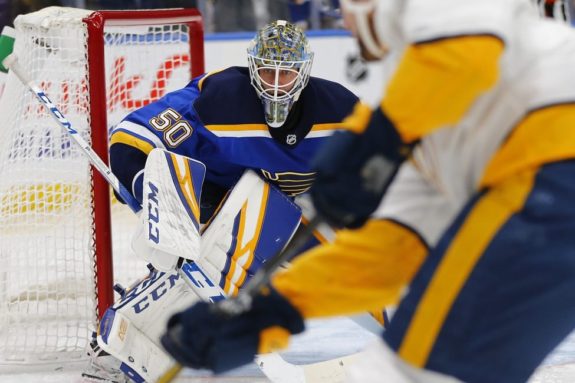Jordan Binnington’s performance as the goaltender for the St. Louis Blues this season has been nothing short of stellar. Despite facing challenges and fluctuations in form earlier in the season, Binnington has returned to the level of play that fans witnessed during the memorable playoff run against the Colorado Avalanche two seasons ago. His consistency between the pipes has been a reassuring constant for the team amid the uncertainties of the current campaign.
As the NHL trade deadline approaches, there is considerable speculation regarding the Blues’ strategy. While some suggest potential trades to bolster the roster, the larger question looms: can the Blues rely on Binnington’s exceptional performance to carry them deep into the playoffs?
The Playoff Race
The Blues find themselves in a prime position to secure a playoff spot, making the idea of selling at the deadline seem counterintuitive. However, the team’s struggles to generate consistent scoring have raised doubts about their ability to make a substantial postseason run. Unlike other Stanley Cup contenders, the Blues lack offensive firepower across their lineup, with significant scoring contributions predominantly coming from their top line.

The first line, consisting of Jordan Kyrou, Robert Thomas, and Pavel Buchnevich, has been impressive, but the team lacks depth in scoring beyond this trio. Although Brayden Schenn has recently shown improvement in his production, the overall offensive output from the rest of the lineup remains inadequate.
Comparing the Blues’ depth to other teams further highlights the disparity. While teams like the Dallas Stars, Carolina Hurricanes, and Vancouver Canucks boast stronger bottom-six production, the Blues lag in offensive contributions from their supporting cast. This discrepancy underscores the need for additional depth scoring to complement the efforts of the top line.
With the trade deadline looming, the Blues face a crucial decision. They can opt to bolster their offensive firepower through strategic acquisitions, addressing the depth-scoring deficiency and enhancing their goal-scoring capabilities. Alternatively, they can place their trust in Binnington’s goaltending prowess, hoping that his stellar performance will propel them to success in the postseason, reminiscent of the 2019 championship run.
While Binnington’s excellence in the crease provides a solid foundation for the Blues, addressing the team’s scoring woes remains imperative. Whether through trade acquisitions or reliance on Binnington’s brilliance, the Blues must navigate the trade deadline strategically to position themselves as legitimate contenders for playoff success.
Related: Oilers Interested in Jordan Binnington, Insider Claims
The question then arises: can the Blues rely solely on Binnington’s brilliance in the crease to overcome their deficiencies and make a deep playoff run? The team’s success in the 2019 Stanley Cup playoffs, where they defied the odds and emerged victorious, was largely attributed to Binnington’s exceptional performance. However, the current roster lacks the depth and offensive firepower of the championship-winning team.
Back in 2019, the Blues’ roster, while solid, was not considered a Stanley Cup contender. However, with Binnington anchoring the team, they defied expectations and accomplished a feat many deemed unattainable. The question now facing the Blues is whether they can replicate that success with the current roster and Binnington’s stellar goaltending.
As the trade deadline approaches, the Blues must weigh their options carefully. While adding offensive reinforcements through trades could address their scoring deficiencies, relying on Binnington’s goaltending to carry them through the playoffs is a risky proposition. The team’s success hinges on finding the right balance between bolstering their offensive capabilities and leveraging Binnington’s performance in the crease.
In conclusion, while Binnington’s excellence in goal provides a strong foundation for the Blues, addressing their scoring woes and defensive vulnerabilities is essential for playoff success. Whether through strategic trades or optimizing Binnington’s support system, the Blues must make calculated decisions to maximize their chances of achieving postseason glory. The path to the Stanley Cup is fraught with challenges, but with the right strategy and execution, the Blues can position themselves as formidable contenders in the quest for hockey’s ultimate prize.
Similarities with the Blues in 2019
The similarities to 2019 are alarming but in the best way possible. The Blues were horrendous and were last in the league when they made a coaching change from Mike Yeo to Craig Berube. Now, the Blues fired Berube after underperforming and struggling to get going, then they hired Drew Bannister as their interim and are currently sitting in a wild card position.
Currently ranked fourth in the central with 54 points, they are in a good spot to be a wild card team. However, they do have a lot of teams right on their tail with 50+ points. The Nashville Predators currently are tied with the Blues with 54 points, and then in the Pacific division, the Los Angeles Kings have 56 points, the Calgary Flames have 53 points, and the Seattle Kraken have 52 points.

Similar to 2019, the Blues trade deadline will be relatively interesting because they don’t have a ton of cap space to grab anyone elite. Still, their team has grinders and players that work hard every night, and they have a goalie that they can lean on and expect him to show up when they need him too.
Jordan Binnington- What do the Analytics Say?
Analyzing goaltender performance in hockey involves a multitude of factors, including various measurable analytics that provide insights into a goaltender’s effectiveness in different game situations. Among these metrics, one that stands out is the assessment of a goaltender’s performance on high-danger chances. These are critical moments during a game where the opposing team has a high probability of scoring due to the proximity of the shooter to the net and other factors that increase the likelihood of a goal being scored.
In the case of Binnington, the measurable analytics paint a picture of a goaltender who has excelled in handling high-danger chances this season. According to the analytics, Binnington has been graded at an impressive 99 in high-danger chances during 5v5 play, indicating his ability to effectively stop scoring opportunities when faced with difficult shots from close range. Additionally, his overall performance in all situations, as reflected by a grade of 97, further underscores his competence and effectiveness as a goaltender.
Another key metric used to evaluate goaltender performance is goals saved above average (GSAA). This metric quantifies the number of goals a goaltender has prevented compared to the league average, providing valuable insight into their impact on the team’s success. In Binnington’s case, his GSAA rating of 84 across all situations highlights his significant contribution to the Blues’ success this season by consistently preventing goals and keeping the team competitive in games.
However, despite Binnington’s overall strong performance, there is a notable area of weakness that warrants attention: his ability to protect rebounds. In multiple games this season, Binnington has struggled to control rebounds effectively, leading to potential scoring opportunities for opposing teams. This weakness is particularly concerning when facing off against top teams with skilled players who excel at crashing the net and capitalizing on second-chance opportunities.
The issue of rebound control raises questions about the Blues’ ability to rely on Binnington as their primary goaltender in high-pressure situations, especially in playoff matchups against formidable opponents. In hockey, where narrow margins and critical moments can often decide games, the importance of a goaltender’s ability to control rebounds and limit second-chance opportunities cannot be overstated.
Reflecting on the Blues’ historic Stanley Cup victory in 2019, it becomes evident that goaltender performance played a pivotal role in their success. Despite not being considered a Stanley Cup-caliber roster by some analysts, the Blues defied expectations and captured the championship largely due to outstanding goaltending from Binnington, who emerged as a key catalyst for the team’s success.
Is the Repeat Possible?
As the Blues continue their quest for another Stanley Cup title this season, the question of whether Binnington can maintain his level of performance and rise to the occasion in critical moments becomes increasingly relevant. While Binnington has demonstrated the ability to excel in various game situations, his struggles with rebound control raise concerns about his consistency and ability to deliver under pressure.
Ultimately, the success of the Blues this season and their potential to contend for the Stanley Cup will depend on Binnington’s ability to address his weaknesses, particularly in rebound control, and elevate his performance to the highest level when it matters most. If Binnington can rise to the occasion and overcome his challenges, the Blues will undoubtedly be a formidable contender in the quest for hockey’s ultimate prize.
